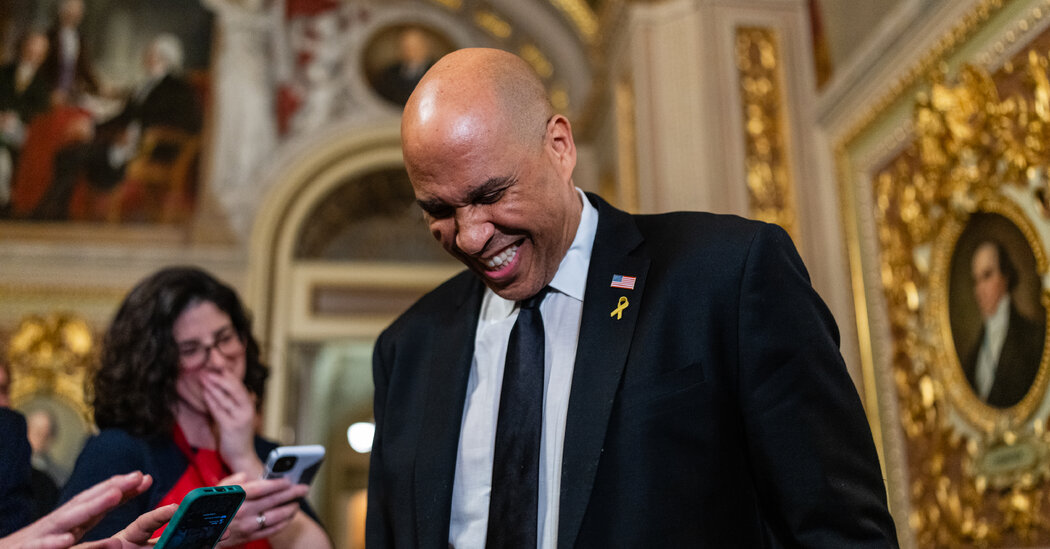For 25 hours straight, Cory Booker stood on the Senate floor delivering the longest speech in the chamber’s history without stopping to eat, go to the bathroom or even sit down.
“It’s an amazing physical feat, absolutely,” said Dr. Santina Wheat, a family medicine doctor at Northwestern Medicine Delnor Hospital in Illinois.
It also goes against all the advice she gives her patients about staying hydrated, getting plenty of rest — and, yes, using the bathroom when they need it.
Mr. Booker, who started speaking Monday evening to condemn the Trump administration and continued to talk until Tuesday night, told reporters that before he started speaking, he had not drunk water since Sunday night, so that he would not have to stop and use the bathroom. He also said that he fasted for days leading up to the speech.
“Both the cognitive and physical aspects of his body are definitely taxed,” said Dr. Joseph Herrera, chair of the department of rehabilitation and human performance for the Mount Sinai Health System. “Just to keep going is mentally draining,” he added.
Dr. Wheat woke up to a chain of messages from doctor friends speculating about whether Mr. Booker was wearing an adult diaper. (Mr. Booker did not respond to a request for comment, but his communications director told an NPR reporter that the senator was not wearing a catheter or a diaper.)
Going that long without using the bathroom can raise the risk of developing kidney stones or urinary tract infections, she said. Mr. Booker, 55, said the dehydration made him “cramp up,” which doctors said could happen when muscles don’t get a break and people do not get enough fluids and electrolytes.
Dehydration can also make people feel more fatigued. It could also lead to dry mouth, and make it even harder to stand for a prolonged period of time, Dr. Herrera said.
Not getting enough nutrients can make people dizzy and lightheaded, particularly during periods of stress, he added. Dr. Herrera typically tells people undergoing strenuous physical challenges, like long runs, to eat two to three hours before, so that their bodies can digest the food and are nourished for the task ahead.
Standing for so long is physically taxing: “Your body is going against gravity,” Dr. Herrera said. That puts pressure on the neck, knees, back and hips, most likely leading to soreness as the muscles strain to balance and hold you upright.
When you’re on your feet for hours, Dr. Wheat added, blood pools toward the bottom of your body and cannot reach the heart as easily. She writes notes for patients with certain medical conditions explaining that they need to sit every hour or so at work to avoid this.
Mr. Booker set out to speak for as long as he was physically able. There were periodic breaks as Democratic colleagues asked him questions, but for the most part, it was just Mr. Booker talking alone about the first months of President Trump’s new administration.
Speaking for that long demands a lot of cognitive energy, said Dr. Indira Gurubhagavatula, a sleep medicine specialist at Penn Medicine.
And it’s especially hard to string together coherent thoughts on little to no sleep: People who pull all-nighters can struggle to pay attention, Dr. Gurubhagavatula said. Even just one night of poor sleep, or no sleep, can impair short-term memory, or make it hard for people to concentrate enough to be articulate.
A night without sleep also just feels bad. It can cause headaches and dizziness and make you feel queasy. It’s harder for some people to manage muscle coordination when they’re sleep-deprived, Dr. Gurubhagavatula said, which means they’re more likely to trip and fall or to drop things.
Mr. Booker, for his part, did not appear to tire. He occasionally rested on the lectern as he spoke. But even in the final minutes of his speech, he spoke loudly and clearly, gesturing with his hands to emphasize his points.
Some research shows that motivation can help people overcome exhaustion. That may explain why Mr. Booker was able to power through for so long, said Jennifer Heisz, an associate professor at McMaster University.
“When it’s very meaningful and purposeful, it could potentially override feelings of fatigue,” she said.
That dedication seemed evident as Mr. Booker wrapped up on Tuesday night. His voice wavered slightly as he leaned against the lectern. But he smiled before he finally said, “I yield the floor.”
Katie Mogg contributed reporting.




